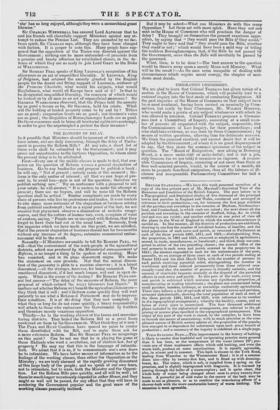THE DANGERS OF DELAY.
Is it possible that Ministers should be ignorant of the evils which have arisen, and are daily increasing, through the delay of Parlia- ment in passing the Itefarin Bills ? At any rate, a short list of those evils shall be subMitted to the Government ; and it may prove not uninstructive to the factious Opposition, to whom alone the *present delay is to be attributed. First—Every one of the middle classes is made to feel, that sus- pense on the question of 'Reform causes a general stagnation of business. Go to any bookseller and propose to publish a book : be will say, " Not at present ; nobody reads at this moment ; Re- form is the only matter of interest ; all that we can hope at pre- sent is, to avoid loss—gain is out of the question ; therefore we publish nothing neiv." 'Try an auctioneer with a proposal to sell your estate : he will answer, " It is useless to make the attempt at present ; there are no buyers, and will be none till the Reform question shall be settled." Similar complaints are made by every class of persons who live by professions and trades. It were useless to cite many more instances of the stagnation of business arising from political excitement ; but as a signal proof of the fact, we are assured that physicians observe a diminution of malades inzagi- naires, and-that the cutters of human hair, even, complain of want of custom, saying, "People are so occupied with Reform, that they forget to have their hair cut at the usual time." Seriously, from the-inquiries which we have made on this point, we are satisfied, that if the present stagnation of business should last for two months without any increase of its degree, extensive commercial embar- rassment will be the result.
Secondly=If Ministers are unable to tell Sir ROBERT PEEL, we will—that the contentment of the work-people in the agricultural districts, which was produced by the Ministerial announcement of Reform, is no longer a thing to be spoken of as existing. Hope has vanished, and in its place discontent reigns. We make the statement on sure grounds. Not that the actual discon- tent of the peasantry is plain to a careless observer ; it is a latent discontent,—all the stronger, however, for being concealed. The smothered discontent, if it last much longer, will end in open de- spair. What is the cause of the feeling ? Sir ROBERT PEEL can- not. but answer—" The delay of the measure of Reform, the mere proposal of which calmed the angry labourer's last March." It matters not whether Reform will benefit the agricultural labourers— they think that it will ; and if Reform come quickly they will wait patiently-to see what a Reformed Parliament may do to improve their condition. It is of the delay that they now complain. If what they so long for do not come quickly, a heavy responsibility will attach to those who embarrass the Government by fruitless and therefore Merely vexatious opposition. Thirdly—As to the working classes of the towns and manufac- turing districts. They hailed the Reform Bill as a great boon conferred on them by the Government. What think they of it now ? The PEEL and HUNT Coalition have spared no' pains to render them dissatisfied with the Bill, and to make them ask for a more extensive Reform. Has Sir ROBERT PEEL no misgivings on this point? Can he not see that he is playing the game of those Radicals who want a revolution, not of election-law, but of property ? He may say that this is the language of intimida- tion. We admit that it is so, if to communicate one's own fears be to intimidate. We have better means of information as to the feelings of the working classes, than either the Opposition or the Ministry ; we are truly alarmed at the rapidly growing discontent of:this large body of the people; and we speak of our own fears, not to intimidate, but to warn, both the Ministry and the Opposi- tion. . Let the Reform.Bills pass quickly, and all will be well ; let them be much longer vexatiously impeded in either House, and they might as well not be passed, for any effect that they will have in rendering the Government popular and the great mass of the "+forking classes peaceably inclined. But it may be asked—What can Ministers do with this crazy Opposition ? Let them act with more spirit. Have they not one man in the House of Commons who will proclaim the danger of delay ? They brought on themselves the present vexatious oppo- sition, by saying that " they would pass the Bills if they could." They ought to have said that " they would pass the Bills, whether they could or not ;" which would have been a mild way of telling the reckless Boroughmongers, that, if the Bills be not passed by the Government, more than the Bills will inevitably be passed by the governed.
What, then, is to be done ?—The best answer to the question would be thrown away upon a merely Mean-well Minishy. What will be the result ?—As the men seem incapable of dealing with circumstances which require moral energy, the chapter of acci- dents must decide.


























 Previous page
Previous page